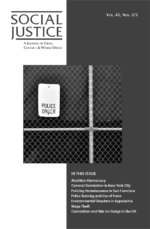Description
No Easy Road to Freedom: Remapping the Struggle for Racial Equality
In this paper Anthony M. Platt offers an overview of the struggle for racial equality within a global context. A useful survey of the trajectory and social context of the struggle for racial equality since World War II, the article traces the detour forced upon movements for socialjustice by McCarthyism, the initial optimism of the 1960s, the stalling of its inertia in the 1970s, and the damaging reversals of the 1980s. With the 1990s, when even the ideal of racialjustice has been repudiated in the nation’s capital, conservatives have announced that the battle for equality has been won, except for their need to undo the “reverse discrimination” they claim is embedded in affirmative action initiatives. This agenda has been coupled with state and national anti- immigration measures, aimed primarily at Central and Latin Americans, Caribbeans, and Southeast Asians, after the success of California’s Proposition 187. In California, there will also soon be a ballot measure calling for the abolition of affirmative action. At the global level today, Platt argues, there are no anti-racist models to draw upon for inspiration (except, ironically, for South Africa perhaps) and there is an abundance of mutually destructive ethnic strife. Despite the great power generated by the Civil Rights Movement, Platt’s brief statistical review of the U.S. devastates the argument that racial equality has been achieved. Indeed, the polarization of wealth has only been exacerbated. In the author’s view, “affirmative action” (a term first used for government action against anti-labor discrimination in the 1930s) stands for the recognition by government that racism is an ongoing, systemic, institutionalized problem (i.e., it is neither an “attitudinal” problem nor a “legacy of the past”) that requires serious, long-term policy initiatives. The article examines the current impasse in the struggle for racial equality by looking at the crisis of denial about racism in the United States, the multiple crises facing liberalism and the nation- state, the crisis of the global, racial divide, and the crisis of identity in the anti-racist movement.
equality; affirmative action; race and politics; racism; U.S. history; liberalism; civil rights movement; anti-racism
Citation: Social Justice Vol. 22, No. 3 (1995): 9-27




Reviews
There are no reviews yet.